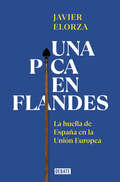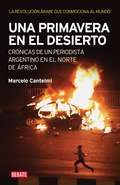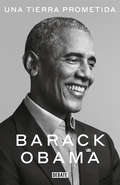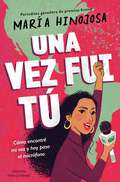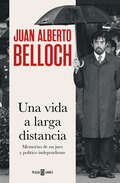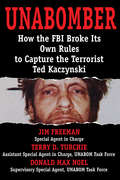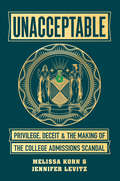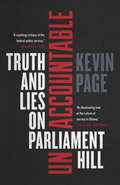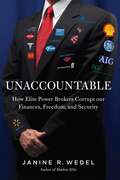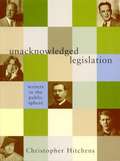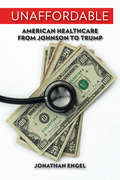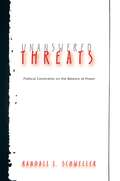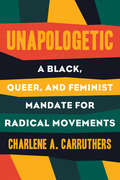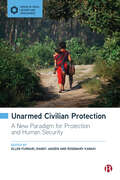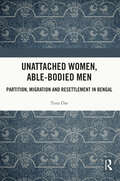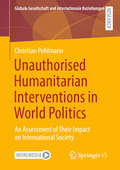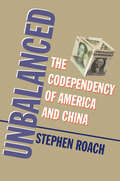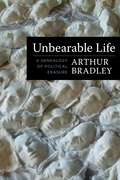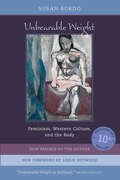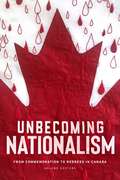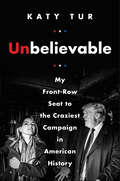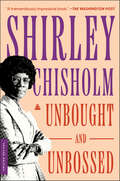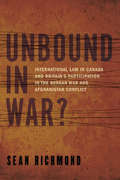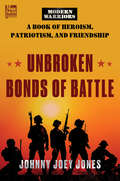- Table View
- List View
Una pica en Flandes: La huella de España en la Unión Europea
by Javier ElorzaUna visión inédita de los mentideros de poder de la Unión Europea ofrecida por Javier Elorza, una de las voces más autorizadas de nuestro país. Alejado de las cámaras y los vaivenes partidistas, Javier Elorza, una de las voces más autorizadas de nuestro país, nos guía en este libro por el lado más desconocido de la política europea. Diplomático y funcionario de carrera, esta crónica personal de su recorrido desde 1986 hasta 2004 como miembro de la representación permanente de España en Europa, en la que ocupó los principales cargos, muestra la Unión Europea desde dentro, con las luchas de poder, los débiles equilibrios de fuerzas, los pactos variables, los acuerdos secretos y los intereses nacionales como verdaderos protagonistas, a veces de manera descarnada y brutal. El autor, en esta visión inédita y privilegiada, nos abre las puertas de los despachos y los mentideros de las instituciones comunitarias, y desgrana el papel que ha desempeñado España en Europa desde su adhesión en 1986, así como el impulso económico y social que esta ha supuesto para nuestro país. De la mano de Felipe González o José María Aznar, relata de un modo ameno y directo los entresijos de las arduas y extenuantes negociaciones que en Maastricht, Ámsterdam, Niza o Lisboa resultaron siempre en más protagonismo e integración de España en la Unión. Nunca nadie había contado esta historia, que además se completa con multitud de anécdotas sobre figuras como Giscard d’Estaing, Jacques Chirac, Gerhard Schröder, John Major, Jordi Pujol, Francisco Fernández Ordoñez, Abel Matutes, etc., esto es, de quienes han moldeado la idea de Europa —y de nuestro país— en los últimos cuarenta años.
Una primavera en el desierto: Crónicas de un periodista argentino en el norte de África. La revolución árabe q
by Marcelo CantelmiEl autor de este trabajo demuestra que ese súbito despertar a lademocracia y a la libertad no fue un gesto espontáneo sino una de lasconsecuencias más extraordinarias de la crisis económica global de 2008. En diciembre de 2010, poco antes de Año Nuevo, un jovencitouniversitario que sobrevivía vendiendo frutas con un carro se encendiócomo una antorcha en Túnez. Ese sacrificio, causado por la furia y lafrustración, fue el disparador de uno de los procesos geopolíticos demayor importancia de este comienzo de siglo. Conocido luego como laPrimavera Árabe, se trató de un conmovedor alzamiento republicano en elnorte de África contra dictaduras que gobernaron por décadas con mano dehierro, muchas de ellas amparadas por Occidente. El autor desmitifica el poder de las redes sociales en la fragua deeste levantamiento y remarca que la Primavera Árabe, maltratada en elmundo por izquierda y por derecha, sí fue, contra lo que muchos piensan,una auténtica revolución, ya que cambió la historia con efectos que nose disiparán. En la heroica plaza Tahrir de El Cairo nació el movimientode los indignados que se esparció de España a Israel y a Wall Street. Esmucho más de lo que se supone lo que ha sucedido y sucede en esaconstelación de naciones. Y es mucho más lo que inevitablemente acabarápor ocurrir.
Una tierra prometida
by Barack ObamaUn relato cautivador y personal de la historia según se va forjando, del presidente que nos ha inspirado a creer en el poder de la democracia. En este extraordinario primer volumen de sus esperadas memorias presidenciales, Barack Obama narra la historia de su sorprendente evolución de ser un joven en busca de su identidad a convertirse en líder del mundo occidental, describiendo con increíble detalle tanto su formación política como los momentos cumbre del primer período de su histórica presidencia, una época de una gran conmoción y de profunda transformación. Obama invita a sus lectores a un viaje cautivador que va desde sus más tempranas aspiraciones políticas, pasando por la decisiva victoria de Iowa que demostró el poder del activismo comunitario, hasta la emotiva noche del 4 de noviembre de 2008, cuando fue elegido el presidente número 44 de los Estados Unidos, convirtiéndose en el primer afroamericano en ocupar el más alto cargo de la nación. El autor reflexiona sobre la presidencia ofreciendo un análisis único y profundo tanto del alcance como de los límites que tiene el poder presidencial, y brinda una visión singular sobre el funcionamiento de la política bipartidista de los Estados Unidos y la diplomacia internacional. Obama lleva a los lectores al interior de la Oficina Oval y de la Sala de Crisis de la Casa Blanca, a Moscú, Cairo, y Beijing, entre otros lugares. Somos espectadores de su pensamiento mientras compone su gabinete, lidia con una crisis financiera global, mide a Vladimir Putin, vence obstáculos aparentemente insuperables para lograr la aprobación del Affordable Care Act, se enfrenta a generales sobre la estrategia de Estados Unidos en Afganistán, aborda la reforma de Wall Street, responde al devastador derrame de petróleo de Deepwater Horizon, y autoriza la Operación Neptune Spear que termina con la muerte de Osama bin Laden. Una tierra prometida esexcepcionalmente íntimo y reflexivo, narra la apuesta de un hombre con la historia, la fe de un organizador comunitario puesto a prueba ante el mundo. Obama expone el difícil equilibrio entre hacer campaña política como afroamericano -cargando con las expectativas de una generación ilusionada por ideales como «esperanza y cambio»- y enfrentar el desafío moral de tomar decisiones de gran trascendencia. Obama habla con franqueza de la fuerte oposición que sufrió tanto en su país como en el extranjero, revela cómo la vida en la Casa Blanca afectó a su esposa y a sus hijas, y no teme confesar sus inseguridades ni decepciones. Sin embargo, nunca duda de su convicción de que, dentro del gran experimento americano, el progreso siempre es posible. Este libro escrito magistralmente refleja la convicción de Barack Obama de que la democracia no es un regalo divino, sino algo cimentado en la empatía y el común acuerdo, que construimos juntos día a día.
Una vez fui tú -- Edición para jóvenes (Once I Was You -- Adapted for Young Readers): Cómo encontré mi voz y hoy paso el micrófono
by Maria HinojosaAhora para jóvenes lectores, la periodista ganadora de cuatro premios Emmy y presentadora de Latino USA de NPR, María Hinojosa, cuenta la historia de la inmigración en los Estados Unidos a través de las experiencias de su familia y décadas de hacer reportajes, con lo cual crea un retrato de un país en crisis.María Hinojosa es una periodista ganadora de premios Emmy y la primera latina en fundar una redacción independiente sin fines de lucro en los Estados Unidos. Pero, antes de todo eso, fue una niña con una gran melena y sueños aún más grandes. Nacida en México y criada en el vibrante barrio de Hyde Park, en Chicago, María siempre buscó la forma de comprender mejor el mundo que la rodeaba… y la manera de encajar en él. En este libro combina historias de su vida, desde la imborrable experiencia de pertenecer a una familia de inmigrantes hasta el momento en que escuchó su propia voz en radio nacional por primera vez, ofreciendo sus observaciones y percepciones sobre la larga y complicada relación entre los Estados Unidos y sus inmigrantes. Divertida, franca y colmada de sabiduría, la historia de María es una que querrás leer una y otra vez, y su voz te inspirará a encontrar la tuya.
Una vida a larga distancia: Memorias de un juez y político independiente
by Juan Alberto BellochLas memorias de Juan Alberto Belloch: un hombre excepcional inmerso en tiempos extraordinarios. La influencia de su madre -mujer de carácter adelantada a su tiempo-, y de su padre -intelectual liberal de linaje republicano- forjaron en Juan Alberto Belloch el deseo de una independencia radical, donde el servicio a su país estuvo siempre por encima de intereses personales o riñas partidistas: primero como juez -uno de los más jóvenes de la naciente democracia- y más tarde al frente delos ministerios de Justicia e Interior, que ocupó en los últimos gobiernos de Felipe González, sin haber militado jamás en el PSOE. Desde sus sucesivas responsabilidades abanderó una forma de entender la política basada en un profundo sentido de la justicia. Lidió con los peores años del terrorismo desde la Audiencia Provincial de Bilbao, modernizó la institución judicial como Vocal del CGPJ, abordó con éxito reformas como la Ley del Jurado y tuvo que hacer frente a sonados escándalos heredados por su ministerio como fueron la fuga y captura de Luis Roldán o las escuchas del CESID, mientras a su alrededor se desataba una feroz lucha por el poder alimentada por la coalición periodística bautizada como el «sindicato del crimen». Superado el ruido y la furia de la última legislatura de González, se entregó en cuerpo y alma a la política local y logró llevar a Zaragoza la Exposición Universal de 2008, un brillante hito en la ciudad de la que fue alcalde más de una década. Este relato, concebido a larga distancia de la mayor parte de los hechos que protagonizó, es el testimonio sincero y apasionado de un hombre que mantuvo su independencia sin perder la lealtad a sus principios.
Unabomber: How the FBI Broke Its Own Rules to Capture the Terrorist Ted Kaczynski
by Donald Max Noel Jim Freeman Terry D. TurchieSoon to be a major motion picture - Unabomb - starring Viggo Mortensen! This is the story of how the FBI broke its own rules to catch the notorious Unabomber, who had randomly killed and maimed people while leaving a cold trail of terrorism for sixteen years. Between 1978 and 1995, the Unabomber mailed 16 bombs, killing three people and injuring 23 more, and the FBI was no closer to catching him. When a new team of hand- picked investigators devised a different strategy to crack the genetic code that protected the Unabomber’s anonymity, the first task was to blast away the layers of bureaucratic constraints that had plagued the earlier efforts to retrace the trail of crimes. As the rules broke and the bureaucratic restraints crumbled, the puzzle pieces of earlier bombings that the terrorist left behind were found and the puzzle collapsed around the Unabomber like a deck of cards. This is the story, told in the narrative, by the three FBI Agents who led the chase, of how, they broke the Bureau’s own rules and finally captured the notorious Unabomber who had led the Federal Bureau of Investigation on the longest chase in its century- old history.
Unacceptable: Privilege, Deceit & the Making of the College Admissions Scandal
by Melissa Korn Jennifer LevitzAn explosive true crime story of fraud, corruption, greed, celebrity, and justice in the cheating scandal that shattered the myth of meritocracy.The largest college admissions scam ever prosecuted by the Department of Justice broke on March 12, 2019, sending shock waves through American schools and families. In Unacceptable, veteran Wall Street Journal reporters Melissa Korn and Jennifer Levitz trace the wiretapped calls, covert payments, and blatant deceit that brought the feds to Beverly Hills mansions and Upper East Side apartments, their residents all linked by one man: college whisperer and ultimate hustler Rick Singer. The shocking tale at the heart of Unacceptable is how, over decades, the charismatic Singer easily exploited a system rigged against regular people. Exploring the status obsession that seduced entitled parents in search of an edge, Korn and Levitz detail a scheme that eventually entangled more than fifty conspirators—a catalog of wealth and privilege that included CEOs, lawyers, real-estate developers, financiers, and famous actresses, mingling in jail cells and courtrooms. Detailing Singer&’s steady rise and dramatic fall, woven with stories of key players in the case, Unacceptable exposes the ugly underbelly of elite college admissions as a game with no rule book—paid-off proctors and storied college coaches turning a blind eye, helicopter parents and coddled teens spinning lies—opening loopholes and side doors into America&’s most exclusive institutions.
Unaccountable
by Kevin PageA unique insider's account of the Harper government so damning that it cannot be ignored In March 2008, Kevin Page was appointed by the federal Conservatives to be the country's first Parliamentary Budget Officer. The move fulfilled a Tory campaign promise to deliver greater government transparency and accountability. He was later denounced by the same people who appointed him to scrutinize their spending. When he challenged the government on several issues--most notably about the true costs of the F-35 fighter planes--and publicly claimed the government was misleading Canadians, Page was vilified. He was called "unbelievable, unreliable and incredible" by then-Finance Minister Jim Flaherty. Page's term was not extended and he retired from the civil service. Page's assessment of the F-35 procurement was proven right, a major embarrassment to the Harper government. But Page's overriding concern is that Parliament does not get the information and analysis it needs to hold the executive (the prime minister and cabinet) to account. Parliament, he argues, is broken, with power centralized in the PMO. The civil service appears cowed, and members of parliament almost never see enough financial analysis to support the policy decisions they make. That was true at various times on the tough-on-crime legislation, new military procurement as well as changes to the Canada Health Transfer and Old Age Security. In this shocking insider's account, Page argues that democracy is being undermined by an increasingly autocratic government that does not respect facts that run counter to its political agenda. Elected officials need accurate, independently verified data to support the implementation of policies and programs. In Unaccountable, Page tells all Canadians why we should be concerned.
Unaccountable: How the Establishment Corrupted Our Finances, Freedom and Politics and Created an Outsider Class
by Janine WedelA groundbreaking book that challenges Americans to reevaluate our views on how a new and more sophisticated style of corruption and private interests have infiltrated every level of society. From the Tea Party to Occupy Wall Street, however divergent their political views, these groups seem united by one thing: outrage over a system of power and influence that they feel has stolen their livelihoods and liberties. Increasingly, protesters on both ends of the political spectrum and the media are using the word "corrupt" to describe an elusory system of power that has shed any accountability to those it was meant to help and govern. But what does corruption and unaccountability mean in today's world? It is far more toxic and deeply rooted than bribery. Advisors, strategists and other private contractors, which make up an ever-increasing share of the government, act in the best interests of their company, versus beholden to the tax payer. Foreign governments with a history of human rights violations, military coups, and more, hire American public relation firms to suppress reports and search results for their crimes. Investigative journalism has been replaced by "truthiness." From Super PACs pouring secret money into our election system, to companies buying better ratings from Standard & Poors, or the extreme influence of lobbyists in congress, all are embody a "new corruption" and remain unaccountable to our society's supposed watchdogs, which sit idly alongside the same groups that have brought the government, business and much of the military in to their pocket.
Unacknowledged Legislation: Writers in the Public Sphere
by Christopher HitchensA celebration of Percy Shelley's assertion that 'poets are the unacknowledged legislators of the world', these 35 essays on writers from Oscar Wilde to Salman Rushdie, dispel the myth of politics as a stone tied to the neck of literature.
Unaffordable: American Healthcare from Johnson to Trump
by Jonathan EngelWritten for nonexperts, this is a brisk, engaging history of American healthcare from the advent of Medicare and Medicaid in the 1960s to the impact of the Affordable Care Act in the 2010s. Step by step, Jonathan Engel shows how we arrived at our present convoluted situation, where generic drugs prices can jump 1,000 percent in a day and primary care physicians can lose 20 percent of their income at the stroke of a Congressional pen. Unaffordable covers, in a conversational style punctuated by apt examples, topics ranging from health insurance, pharmaceutical pricing, and physician training to health maintenance organizations and hospital networks. Along the way, Engel introduces approaches that other nations have taken in organizing and paying for healthcare and offers insights on ethical quandaries around end-of-life decisions, neonatal care, life-sustaining treatments, and the limits of our ability to define death. While describing the political origins of many of the federal and state laws that govern our healthcare system today, he never loses sight of the impact that healthcare delivery has on our wallets and on the balance sheets of hospitals, doctors' offices, government agencies, and private companies.
Unanswered Threats: Political Constraints on the Balance of Power (Princeton Studies in International History and Politics #110)
by Randall L. SchwellerWhy have states throughout history regularly underestimated dangers to their survival? Why have some states been able to mobilize their material resources effectively to balance against threats, while others have not been able to do so? The phenomenon of "underbalancing" is a common but woefully underexamined behavior in international politics. Underbalancing occurs when states fail to recognize dangerous threats, choose not to react to them, or respond in paltry and imprudent ways. It is a response that directly contradicts the core prediction of structural realism's balance-of-power theory--that states motivated to survive as autonomous entities are coherent actors that, when confronted by dangerous threats, act to restore the disrupted balance by creating alliances or increasing their military capabilities, or, in some cases, a combination of both. Consistent with the new wave of neoclassical realist research, Unanswered Threats offers a theory of underbalancing based on four domestic-level variables--elite consensus, elite cohesion, social cohesion, and regime/government vulnerability--that channel, mediate, and redirect policy responses to external pressures and incentives. The theory yields five causal schemes for underbalancing behavior, which are tested against the cases of interwar Britain and France, France from 1877 to 1913, and the War of the Triple Alliance (1864-1870) that pitted tiny Paraguay against Brazil, Argentina, and Uruguay. Randall Schweller concludes that those most likely to underbalance are incoherent, fragmented states whose elites are constrained by political considerations.
Unapologetic: A Black, Queer, and Feminist Mandate for Radical Movements
by Charlene CarruthersA manifesto from one of America's most influential activists which disrupts political, economic, and social norms by reimagining the Black Radical Tradition. <P><P>Drawing on Black intellectual and grassroots organizing traditions, including the Haitian Revolution, the US civil rights movement, and LGBTQ rights and feminist movements, Unapologetic challenges all of us engaged in the social justice struggle to make the movement for Black liberation more radical, more queer, and more feminist. This book provides a vision for how social justice movements can become sharper and more effective through principled struggle, healing justice, and leadership development. It also offers a flexible model of what deeply effective organizing can be, anchored in the Chicago model of activism, which features long-term commitment, cultural sensitivity, creative strategizing, and multiple cross-group alliances. And Unapologetic provides a clear framework for activists committed to building transformative power, encouraging young people to see themselves as visionaries and leaders.
Unarmed Civilian Protection: A New Paradigm for Protection and Human Security
by Ellen Furnari, Randy Janzen and Rosemary KabakiThe frequent failure of military or armed interventions to protect civilians is well known. This edited collection provides a comprehensive account of a different, effective paradigm: unarmed civilian protection (UCP). The principles and methods of UCP have been used for many decades to protect both specific, threatened individuals as well as whole communities. Featuring contributions from around the world, this book brings together a wide range of UCP practices in order to examine their underlying theory and interrelated strategies. The book provides an important illustration of the contributions UCP can make, while also discussing its limitations and failures.
Unassimilable Feminisms
by Laura GillmanIn an important new book, Laura Gillman argues that in this post-identity politics era, identities can still yield reliable knowledge. Focusing on womanist and mestiza theoretical writings, literary texts, and popular cultural representations, Gillman advances a comparative theoretical model of identity and consciousness that foregrounds a naturalist-realist account. She demonstrates that reason and knowledge originate from diverse human practices enacted in the social and natural world and can be explained and justified entirely in terms of them.
Unattached Women, Able-Bodied Men: Partition, Migration and Resettlement in Bengal
by Tista DasThis book is one of the few gendered histories of the Partition experience in Bengal. Tracing the afterlife of the Partition in Bengal through the gendered experience of displacement and resettlement, it analyses the spatial reconfigurations that were brought about. Drawing heavily on police records, private papers, newspapers and memoirs, this work enters the realm of personal time in the lives of the migrant and refugee and follows them to see how the spaces that they inhabited, the city of Calcutta and its suburbs, were transformed to accommodate them and imposed with new meanings and one might say, new borders. It highlights how ‘fear’ came to be the dominant emotion associated with the migrants’ flight, how it was subsequently politicized and how it became the cornerstone of the refugees’ bargaining with the state. Furthermore, it focuses on how the state, in its attempt to become a charitable institution, put in place a gendered structure of relief and later, rehabilitation. This work also shows how camps and colonies became the sites of political contestation, how the refugees found a brand of Leftist politics particularly useful for their purpose and how it became the cornerstone of their newfound identity. A major intervention in Partition studies, the volume will be of great interest to scholars and researchers of South Asian history, migration and diaspora studies, gender studies and politics.
Unauthorised Humanitarian Interventions in World Politics: An Assessment of Their Impact on International Society (Globale Gesellschaft und internationale Beziehungen)
by Christian PohlmannThe question if states should intervene in massive humanitarian emergencies without a legal right to do so, is still object of an important debate in the theory and practice of international relations. This situation has not changed with the emergence of the ‘Responsibility to Protect’ norm, which stopped short of a right to intervene without a Security Council authorisation. The book assesses the impact of such unauthorised humanitarian interventions on international society and regions; it is written in the context of the English School of International Relations. Based on empirical studies the author argues that they can be progressive-constructive for international order, if conducted with explicit legitimacy, integrity, and great power participation. The argument is based on the analysis of six cases conducted between 1946 and 2005. Specific consideration is given to the cases of Liberia (1990) and Kosovo (1999). In sum, the book contributes to the solidarism-pluralism debate and the discourse on humanitarian interventions.
Unbalanced
by Stephen RoachThe Chinese and U. S. economies have been locked in an uncomfortable embrace since the late 1970s. Although the relationship initially arose out of mutual benefits, in recent years it has taken on the trappings of an unstable codependence, with the two largest economies in the world losing their sense of self, increasing the risk of their turning on one another in a destructive fashion In Unbalanced: The Codependency of America and China Stephen Roach, senior fellow at Yale University and former chairman of Morgan Stanley Asia, lays bare the pitfalls of the current China-U. S. economic relationship. He highlights the conflicts at the center of current tensions, including disputes over trade policies and intellectual property rights, sharp contrasts in leadership styles, the role of the Internet, the recent dispute over cyberhacking, and more. A firsthand witness to the Asian financial crisis of the late 1990s, Roach likely knows more about the U. S. -China economic relationship than any other Westerner. Here he discusses: Why America saving too little and China saving too much creates mounting problems for both How China is planning to re-boot its economic growth model by moving from an external export-led model to one of internal consumerism with a new focus on service industries How America, shows a disturbing lack of strategy, preferring a short-term reactive approach over a more coherent Chinese-style planning framework The way out: what America could do to turn its own economic fate around and position itself for a healthy economic and political relationship with China In the wake of the 2008 crisis, both unbalanced economies face urgent and mutually beneficial rebalancings. Unbalanced concludes with a recipe for resolving the escalating tensions of codependence. Roach argues that the Next China offers much for the Next America#151;and vice versa.
Unbearable Life: A Genealogy of Political Erasure (Insurrections: Critical Studies in Religion, Politics, and Culture)
by Arthur BradleyIn ancient Rome, any citizen who had brought disgrace upon the state could be subject to a judgment believed to be worse than death: damnatio memoriae, condemnation of memory. The Senate would decree that every trace of the citizen’s existence be removed from the city as if they had never existed in the first place. Once reserved for individuals, damnatio memoriae in different forms now extends to social classes, racial and ethnic groups, and even entire peoples. In modern times, the condemned go by different names—“enemies of the people;” the “missing,” the “disappeared,” “ghost” detainees in “black sites”—but they are subject to the same fate of political erasure.Arthur Bradley explores the power to render life unlived from ancient Rome through the War on Terror. He argues that sovereignty is the power to decide what counts as being alive and what does not: to make life “unbearable,” unrecognized as having lived or died. In readings of Augustine, Shakespeare, Hobbes, Robespierre, Schmitt, and Benjamin, Bradley asks: What is the “life” of this unbearable life? How does it change and endure across sovereign time and space, from empires to republics, from kings to presidents? To what extent can it be resisted or lived otherwise? A profoundly interdisciplinary and ambitious work, Unbearable Life rethinks sovereignty, biopolitics, and political theology to find the radical potential of a life that neither lives or dies.
Unbearable Weight: Feminism, Western Culture, and the Body
by Susan Bordo"Unbearable Weight is brilliant. From an immensely knowledgeable feminist perspective, in engaging, jargonless (!) prose, Bordo analyzes a whole range of issues connected to the body—weight and weight loss, exercise, media images, movies, advertising, anorexia and bulimia, and much more—in a way that makes sense of our current social landscape—finally! This is a great book for anyone who wonders why women's magazines are always describing delicious food as 'sinful' and why there is a cake called Death by Chocolate. Loved it!"—Katha Pollitt, Nation columnist and author of Subject to Debate: Sense and Dissents on Women, Politics, and Culture (2001)
Unbecoming Nationalism: From Commemoration to Redress in Canada
by Helene VostersCanada’s recent sesquicentennial celebrations were the latest in a long, steady progression of Canadian cultural memory projects. Unbecoming Nationalism investigates the power of commemorative performances in the production of nationalist narratives. Using “unbecoming” as a theoretical framework to unsettle or decolonize nationalist narratives, Helene Vosters examines an eclectic range of both state-sponsored social memory projects and counter-memorial projects to reveal and unravel the threads connecting reverential military commemoration, celebratory cultural nationalism, and white settler-colonial nationalism. Vosters brings readings of institutional, aesthetic, and activist performances of Canadian military commemoration, settler-colonial nationalism, and redress into conversation with literature that examines the relationship between memory, violence, and nationalism from the disciplinary arenas of performance studies, Canadian studies, critical race and Indigenous studies, memory studies, and queer and gender studies. In addition to using performance as a theoretical framework, Vosters uses performance to enact a philosophy of praxis and embodied theory.
Unbelievable: My Front-Row Seat to the Craziest Campaign in American History
by Katy TurThe New York Times bestseller. “This book couldn’t be more timely, appearing as President Trump ratchets up his attacks on the news media.” —Jill Abramson, The New York Times Book ReviewKaty Tur lived out of a suitcase for a year and a half, following Trump around the country, powered by packets of peanut butter and kept clean with dry shampoo. She visited forty states with the candidate, made more than three,800 live television reports, and tried to endure a gazillion loops of Elton John’s “Tiny Dancer” —a Trump rally playlist staple.From day one to day 500, Tur documented Trump’s inconsistencies, fact-checked his falsities, and called him out on his lies. In return, Trump repeatedly singled Tur out. He tried to charm her, intimidate her, and shame her. At one point, he got a crowd so riled up against Tur, Secret Service agents had to walk her to her car.None of it worked. Facts are stubborn. So was Tur. She was part of the first women-led politics team in the history of network news. The Boys on the Bus became the Girls on the Plane. But the circus remained. Through all the long nights, wild scoops, naked chauvinism, dodgy staffers, and fevered debates, no one had a better view than Tur.Unbelievable is her darkly comic, fascinatingly bizarre, and often scary story of how America sent a former reality show host to the White House. It’s also the story of what it was like for Tur to be there as it happened, inside a no-rules world where reporters were spat on, demeaned, and discredited. Unbelievable is a must-read for anyone who still wakes up and wonders, Is this real life?
Unbought and Unbossed
by Shirley ChisholmIn this classic work—a blend of memoir, social criticism, and political analysis that remains relevant today—the first Black Congresswoman to serve in American history, New York’s dynamic representative Shirley Chisholm, traces her extensive political struggle and examines the problems that have long plagued the American system of government.“A tremendously impressive book.” —Washington Post“What [Chisholm] did was so pioneering. . . . She embraced what made her different and used it as her superpower.” —Regina King“I want to be remembered as a woman . . . who dared to be a catalyst of change.” Political pioneer Shirley Chisholm—activist, member of the House of Representatives, and former presidential candidate—was a woman who consistently broke barriers and inspired generations of American women, and especially women of color. Unbought and Unbossed is her story, told in her own words—a thoughtful and informed look at her rise from the streets of Brooklyn to the halls of Congress. Chisholm speaks out on her life in politics while illuminating the events, personalities, and issues of her time, including the schism in the Democratic party in the 1960s and ’70s—all of which speak to us today.In this frank assessment, “Fighting Shirley” recalls how she took on an entrenched system, gave a public voice to millions, and embarked on a trailblazing bid to be the first woman and first African American President of the United States. By daring to be herself, Shirley Chisholm shows how one person forever changed the status quo.Look out for the biopic Shirley, directed by John Ridley and starring Regina King, coming in March 2024.“Her motto and title of her autobiography—Unbought and Unbossed—illustrates her outspoken advocacy for women and minorities during her seven terms in the U.S. House of Representatives.” —National Women’s History Museum
Unbound in War?: International Law in Canada and Britain’s Participation in the Korean War and Afghanistan
by Sean RichmondIn Unbound in War?, Sean Richmond examines the influence and interpretation of international law in the use of force by two important but understudied countries, Canada and Britain, during two of the most significant conflicts since 1945, namely the Korean War and the Afghanistan Conflict. Through innovative application of sociological theories in International Relations (IR) and International Law (IL), and rigorous qualitative analysis of declassified documents and original interviews, the book advances a two-pronged argument. First, contrary to what some dominant IR perspectives might predict, international law can play four underappreciated roles when states use force. It helps constitute identity, regulate behaviour, legitimate certain actions, and structure the development of new rules. However, contrary to what many IL approaches might predict, it is unclear whether these effects are ultimately attributable to an obligatory quality in law. This ground-breaking argument promises to advance interdisciplinary debates and policy discussions in both IR and IL.
Unbroken Bonds of Battle: A Modern Warriors Book of Heroism, Patriotism, and Friendship
by Johnny Joey JonesINSTANT NEW YORK TIMES BESTSELLER!Life only really starts when we start serving others.For many people, military service isn’t simply a job. It’s a ticket out of a lonely society and into a family of enduring bonds.In over a decade of working with veterans, Johnny Joey Jones has discovered the power of battle-forged friendships. Suffering a life-changing injury while deployed in Afghanistan, he faced a daunting recovery. But coming home would have been much harder without the support of his brothers and sisters in arms.In Unbroken Bonds of Battle, Joey tells the stories of those very warriors, who for years have supported and inspired him on the battlefield and off. Through unfiltered and authentic conversations with American heroes in every branch of service, Joey tackles the big questions about life, loss, and, of course, hunting.Powerful life lessons are woven throughout these personal oral histories. Also included is a scrapbook of beautiful candid photographs from the lives of these modern warriors.A gorgeous patriotic keepsake, Unbroken Bonds of Battle reminds us of the costs paid by those who defend our freedom through unvarnished, inspiring tales of friendship.
